|
|
Basement contractors.
If you are here because you are looking for a basement contractor, you must go to this page as well Basement Construction Law.
it is easy to expect your contractor to overcome hidden problems at their expense, not yours.
But it is often equally easy for the contractor to hide them.
it is easy for the contractor to cut corners. For example, he may buy just one load of waterproof oncrete to get a delivery ticket as evidence. Then buy ordinary concrete after that for 40% less but charge you full price.
He will have gone months before the deception is discovered.
|
|
|
A contract is legally binding. A set of conditions agreed upon including conditions not mentioned but are implied by statute or precedent.
The Art of business is to do better out of a contract than the other side. Many people who would like a basement made their money through business and contracts. The question is, no matter how good you are within your own sector of business, how good will you be as a newcomer to construction - and the rather evil Construction Act that might make a mockery of all you already know?
Typically, the client side, which includes main contractors hiring sub-contractors, wins more by paying less than they perhaps should. The workforce side wins more by cutting corners on quality and materials, by getting paid for what they did not fit or did not do properly.
In your business, the workforce side might depend on your repeat business. In house basement construction they almost never will.
When both win, when the sub-contractor cuts enough corners to still profit when under-paid, the client loses because they are left with a whole lot of problems.
|
|
When I last worked for a large company, the QSs would refuse to pay sub-contractors for reasonable extras, but they would successfully claim those same extras from the client and keep all of it.
|
|
This web site is about building a problem-free basement structure completely waterproof from the reinforced concrete alone. Right First Time, and not entering into a contract is the first and most necessary step to achieving that.
Since 2004, I built many basements for people with a fixed priced contract.
Typically, in a year, 3 would go to plan and I would make a living.
Another would go very well and I kept some contingency money for myself.
But one would go badly, usually because the client had not investigated the ground fully, and I would lose my shirt.
For years I worked hard but only scraped a living.
But sometimes, and every time since 2017, I would be paid by the day. The client would pay the labour and for plant and materials as we went along.
I would manage, train and supervise as required with the client's best interests at heart.
If the client or I did not like what someone was doing, the client paid them up to date and told them not to come back. The problem stopped. Very easily.
If the client wanted to change something. No problem. No arguing over money.
Most of the time the clients behaved themselves, I saved them 30% - even more if it was an extension and they had to pay VAT because I would make sure neither I nor the labour were VAT registered - and they were happy with the outcome.
Since 2017 probably all but one client, renowned I learned later for cutting corners in all his properties he developed, were very happy with the outcome.
I am convinced that private clients are much happier if they do not enter into a contract. It allows them to speak up and be listened to.
It allows them to stop anything they don't like. It allows them to make changes without penalties.
Many people think they can sue a contractor if they find faults. The law says you cannot. Read the page about Construction Law.
You don't find faults immediately because basements are built in holes that fill up with rain and muck. Then the basement fills up with rain and muck after it is finished while the building above it is getting built - until you get your roof on, windows in and you pump the rain out. Your rogue basement contractor has long gone by then.
BS8102 was re-issued in April 2022, and it requires the structure to be repaired of leaks, it might be possible to include in the contract for a basement 'built and completed to BS8102:2022'. Then, when the last payment is due withhold 10% or so of the full contract value until after the basement has been pumped, cleaned and dried and there are no leaks following a period of heavy rain.
The first time a contractor returns to stop leaks through his work, I expect they will find it impossible to stop them completely.
He might find this web site before his next basement and learn how to build better in future.
|
Many people think they found a good team. Honest people and the first men to start impress them. But, as the weeks go by, the good guys seem to get replaced by others who don't really know what to do. Phone calls get promises but they don't get the good guys back for more than a couple of days.
This other page starts with a list and explanation of the causes of leaks in new basements How not to build a basement.
How I got cheated several times was with a poor soil investigation.
The very nice people who got me to agree to build their basement for a fixed price, despite the information looking like it might not be complete, turned very nasty indeed when the missing information turned into 'someone has to find more money'. It is usually absolutely vital that you get a professional and thorough soil investigation report before you expect to hire a good contractor. If you don't have it
a good contractor should refuse to enter discussions.
I suspect most contractors would take what money they could and do a runner when things turn bad.
The irony is, in every case where we fell out I would have carried on if they had covered the extra cost. But after we fell out they needed to find a firm who would sort things out - and that always costs even more in the end.
One of them, I wanted £18,000 more but I learned it cost them £40,000 more.
If you are honest and you want a good outcome, hire a manager and pay everyone yourself.
Keep a close enough eye on things to let go anyone you don't feel happy enough with, especially if that is your manager.
This text box is repeated on other pages.
Supervision is essential.
Otherwise, usually:
-
Water will be added to concrete and instead of being waterproof it will be porous
-
Concrete will be segregated by over compaction
-
A contractor will usually form concrete kickers which will be expensive and all but impossible to waterproof later
-
A contractor will usually leave an otherwise waterproof concrete wall full of holes
-
Joints will not be scabbled (roughened properly), cleaned or kept clean. Expensive tapes and strips will not be fitted or fixed properly.
-
Formwork will be too deep to deliver concrete to the bottom in good condition
-
Formwork will be too deep to get the vibrating poker to the bottom to properly remove all the air
-
Formwork will be loosened too early, releasing moisture essential for the chemical reactions yet to take place before the concrete becomes waterproof.
Somehow, when this wall was being formed, dirt (sand, silt, clay) got inside the formwork but no one cleaned it out.
When the concrete arrived it sat on top of the dirt.
Later, the dirt washed out leaving this void. And it leaked.
There was a joint strip in there as well, but it didn't work.
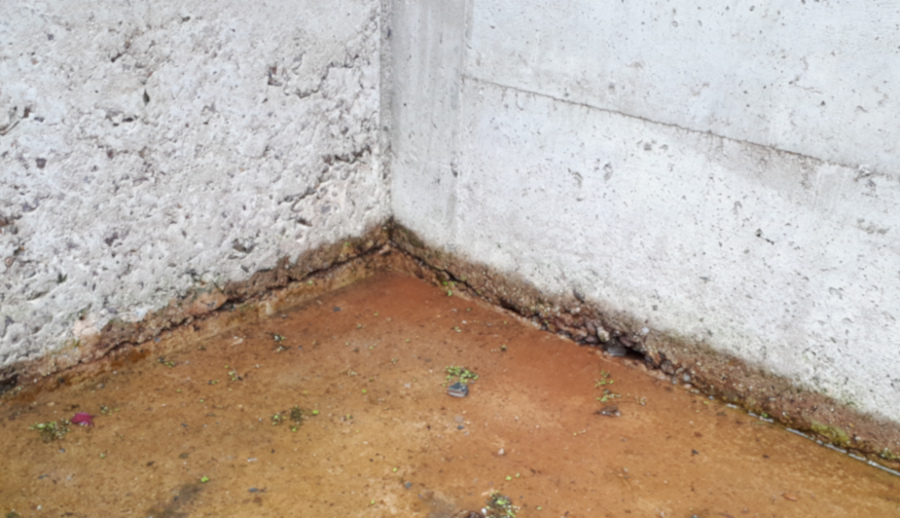
Quite honestly, I cannot imagine why these contractors made a void with polystyrene when the concrete should be helping to hold up the house. They hid it. It wasn't discovered for 8 years.
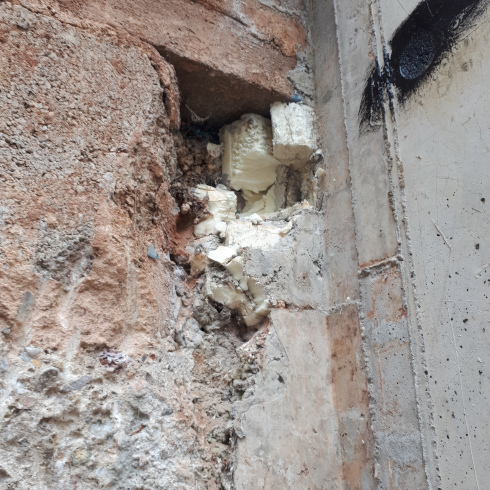
|
|
This segregation happened when the concrete was released in formwork too tall and as the concrete crashed through the steel reinforcement it lost a little bit of cement slurry as it coated every bar and the first stones arrived all alone.
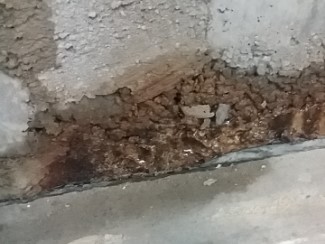
Contractors always use formwork too tall because it means they hire less and use it many times to form many sections. But this also means many more joints.
|
|
I was sent this photo years ago. The main contractor was trying to fix the leaks left by his sub-contractor a year earlier. But this office block was only now getting fitted out. I believe this was a beneath-ground lift pit. A lift pit is the safe area beneath a lift for someone to crouch in and not get squashed if the lift comes down on top of them.
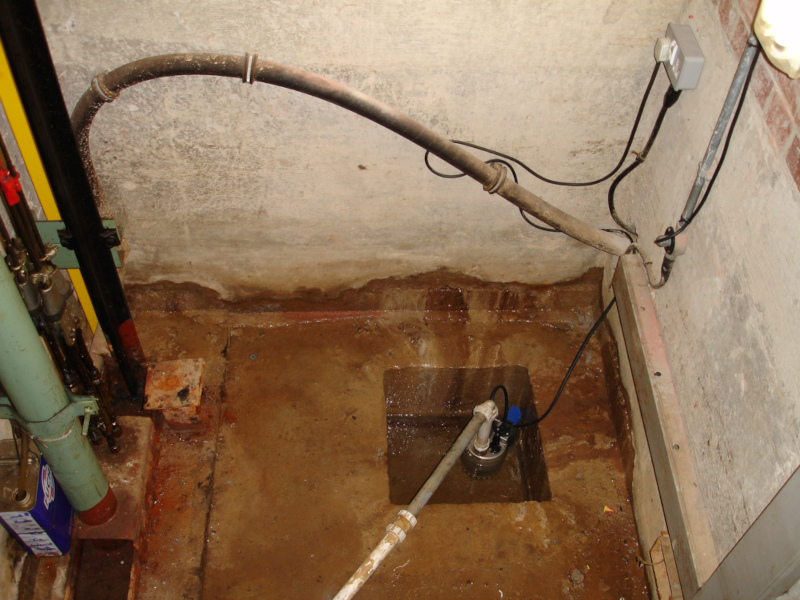
In the UK, contractors always seem to use steel threaded rods in plastic sleeves. They take the rods out to use them again and leave an otherwise waterproof concrete wall full of holes. If they tell their labourer to fix them, you can be sure he won't fix them all properly.
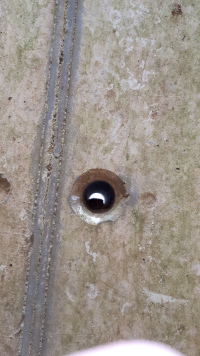
|
|
I was asked to go and see what I could do about the problems in a mansion being built for a footballer in Cheshire. The basement was vast. It should have been finished but they still had water getting in everywhere.
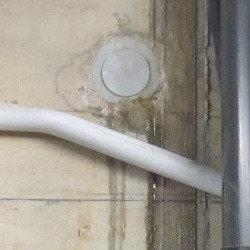
|
|
I hear this so often. The main contractor brought in a sub-contractor who said he did this work all the time. What he really meant was he is a formwork carpenter who does this work all the time as a member of a team with a foreman and manager over him to ask for advice and to sort out problems.
On his own and finding himself in charge he got it terribly wrong.
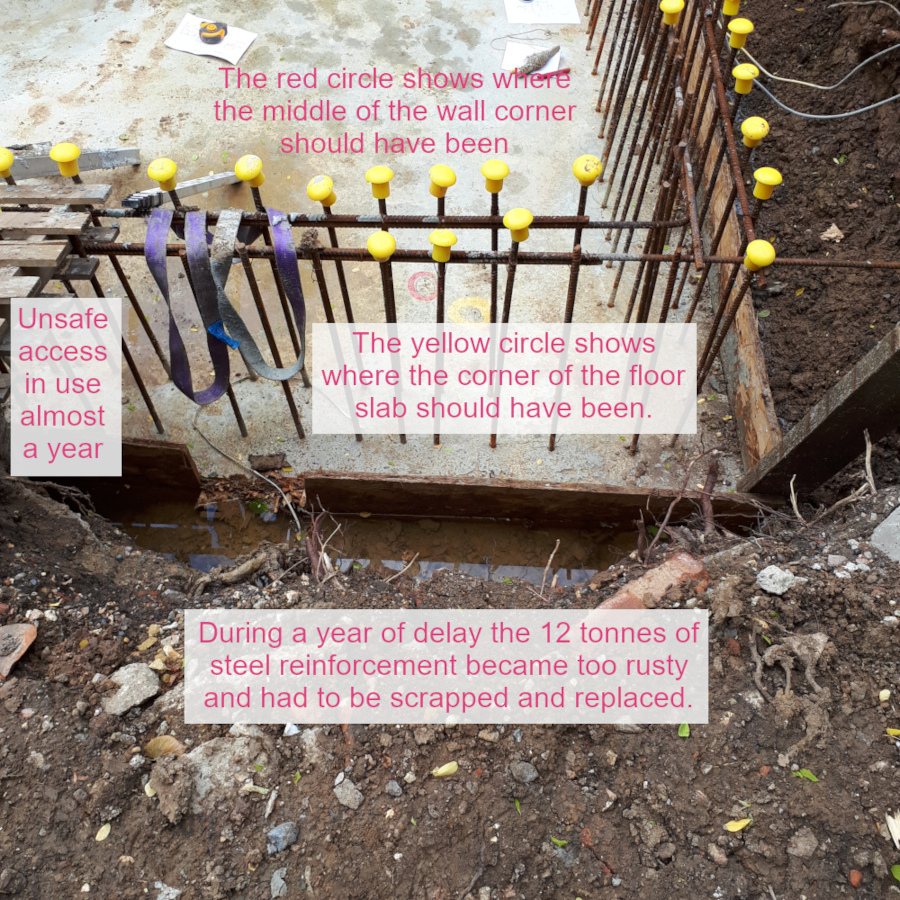
The problem with wonderful-sounding strips that expand in a joint and, it is claimed, seal a leak, is they come out of the box rolled up and they don't want to stick on straight. Nailing them makes them even worse. Where concrete gets behind the tape there is nothing in the joint after all.
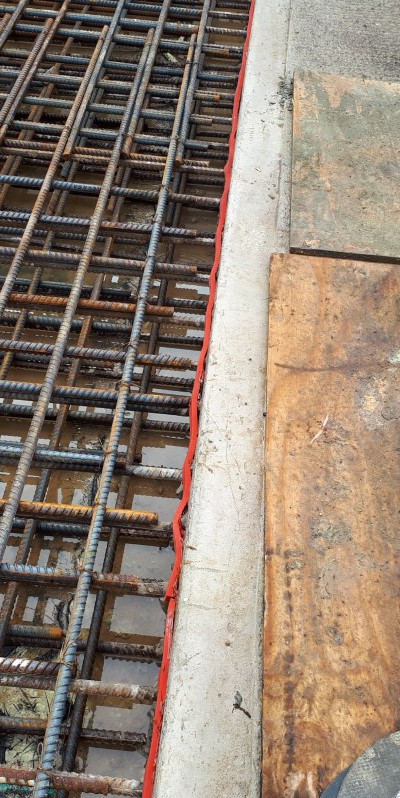
|
|
|
But if there is a joint strip that I know works for one team (who have plenty of work with the firm that employs them) it is Fradiflex. But in this case, a contractor did not take off the protective film and neither did they overlap the joints properly.
The white stuff is the protective film that should have been removed to expose the bitumen paint.
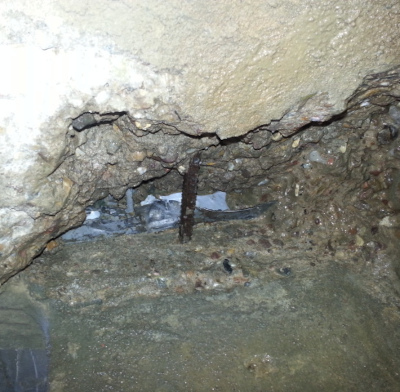
It's chiselled out because it is leaking.
|
First, this corner pile was augered and filled in the wrong place. It should have been discovered and another put in just behind so that the first could have been chiselled away when they excavated.
Second. There should never have been this gap left between waterproof concrete walls.
Everyone on site would have known about this when they set their formwork up.
Everyone kept quiet.
|
|
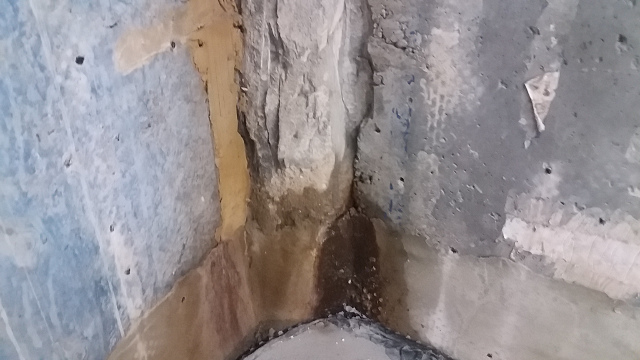
|
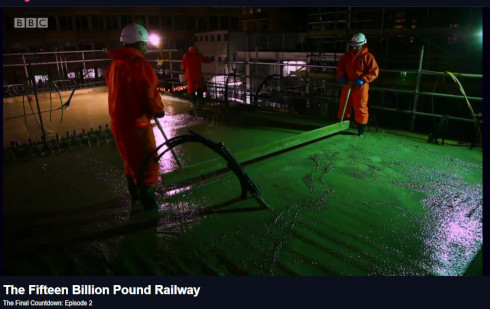
|
|
The amount of excess water coming out of this concrete is ridiculous.
Extra water gets added at site because it makes the labourers' work spreading it a lot easier.
But it weakens the concrete and causes drying shrinkage cracks a few years later.
Someone will be fixing a problem over the Elizabeth line. I hope it is a leak and not a collapse that kills someone.
If they let the BBC film it they must think it is normal.
What do they get up to when no one is looking?
|
This is the 2009 way of building a basement still being specified and built today in contravention of the new edition of BS8102. These are practices that must stop.
Practices that leak causing the internal drainage pump or the discharge plumbing to fail.
Seasoned professionals will all use steel threaded rods in a plastic sleeve. They leave the plastic sleeve as a hole through otherwise waterproof concrete; or else they fill the holes but some leak.
I was sent these images by a prospective client looking for a different basement builder, so I don't know where he found them. He is planning a second basement and he says his first basement leaks - so perhaps this is it.
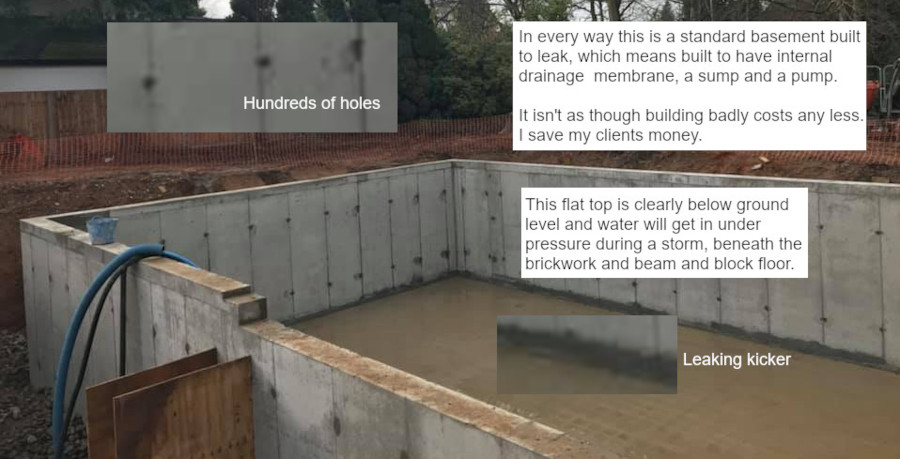
And here we see the same hole destined to get the Delta-type sump for a pump, backup pump and backup power supply. All very expensive and not guaranteed to work either.
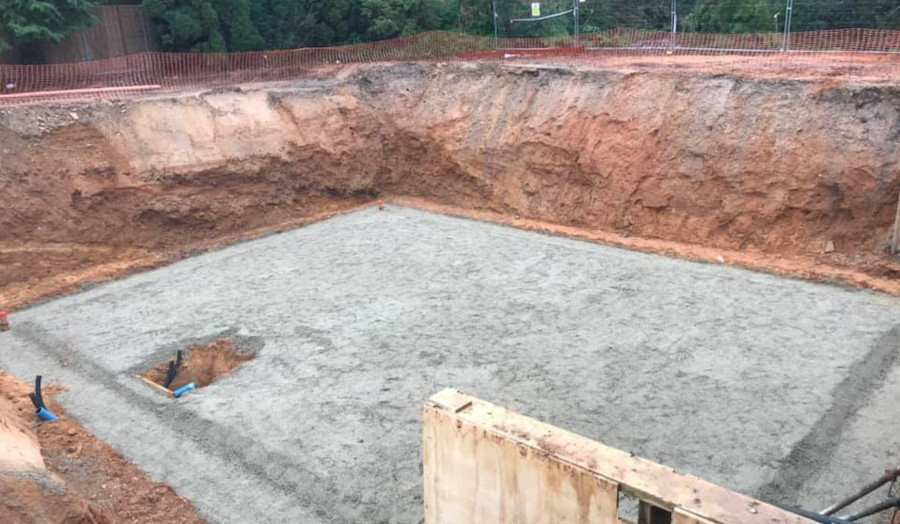
PLUS. HORROR !!!! The pipes and ducts connecting the outside to the inside are underground but not set in any waterproof concrete.
The shingle you can see in the photo above would have damaged the joints between sections of duct when it was tipped in. When the shingle fills up during a severe storm, water could flood in through these various duct joints far faster than the pump could pump it out. Pushing the drainage membrane off the wall, flooding the basement temporarily and leaving plasterboard, decoration and furnishings ruined.
No fancy warranty from a respected waterproofing company will cover any of this and all the 10 year latent defects insurers exclude waterproofing below ground.
These built-in errors are at the risk of the householder. No one else.
The family who live here won't be happy when it floods.
Also filmed by the BBC and with some endorsement by the Open University as well, another example of lots of water added at site. This time to get through closely packed steel reinforcement, that should have been tied differently to leave wider gaps, without any effort on the part of the labourers.
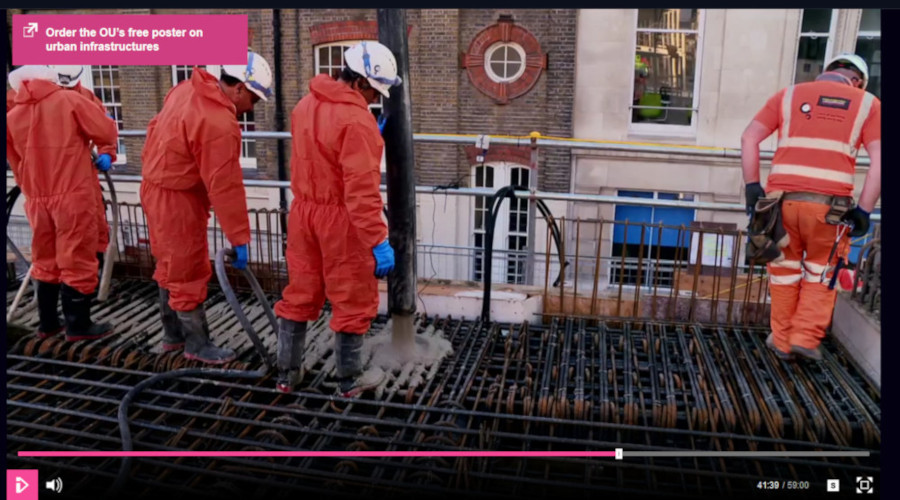
I was once asked to be the eyes and ears for the client and to watch and report on his contractor, just on concrete pour days, a large London firm who really boast how good they are.
Building Control had already been and approved the steel.
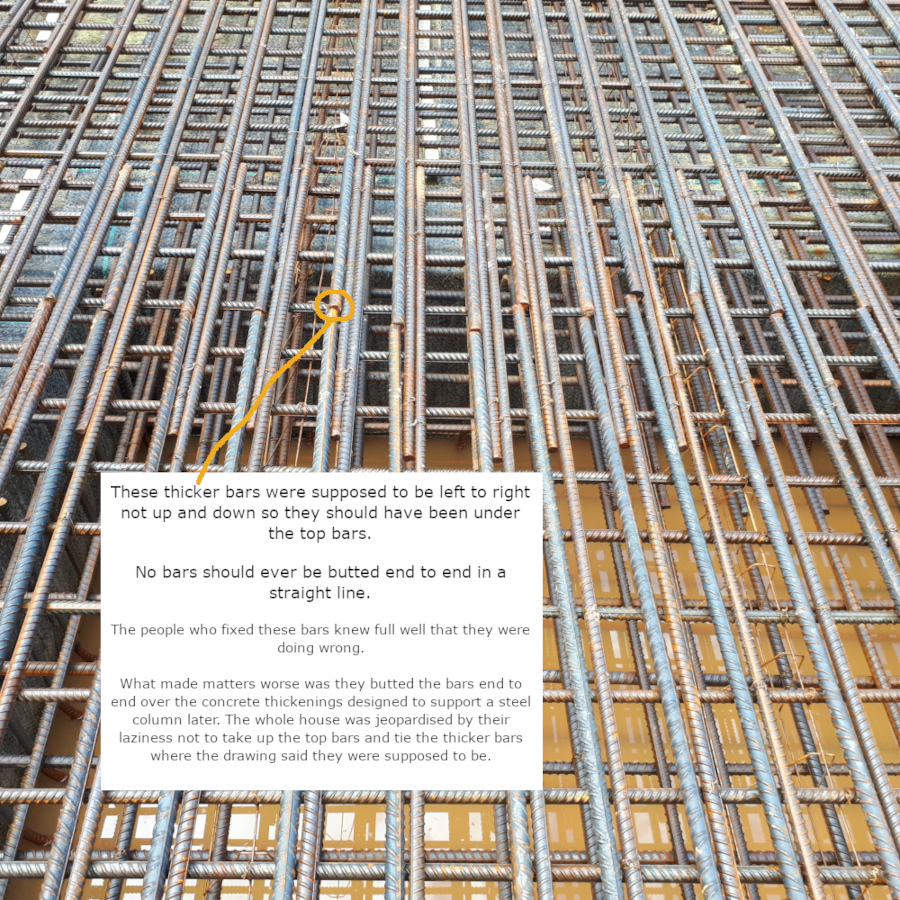
I had no authority over this gang but they let me tie the top bars properly and add steel where their cage was too low before they got that far with the concrete.
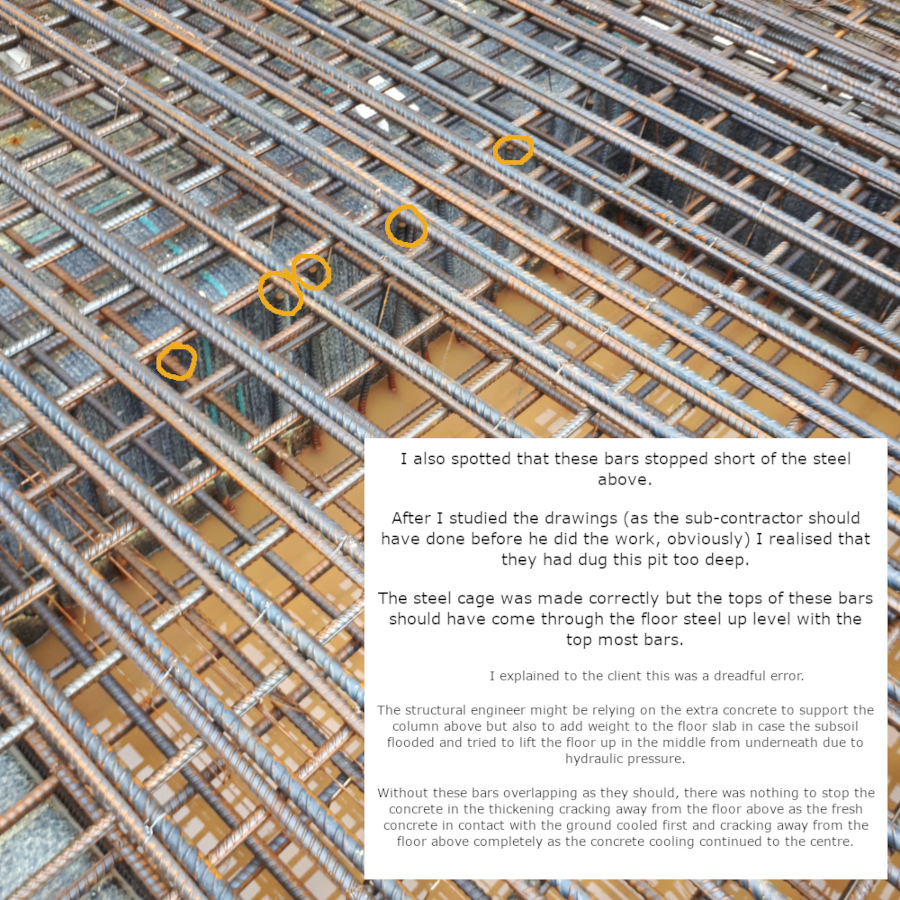
Thermal shrinkage cracking.
My solution is to pour all the wall all round in one go without joints and in two pours, bottom and top. My way needs more formwork and more steel reinforcement. But it is waterproof.
The usual contractor solution is to hire less formwork. Just enough to use many times and complete the work within the minimum 4 week hire.
But that will mean taller formwork, which means leaking voids at the bottom of the wall, and a lot of vertical joints which are also prone to leak.
This is where I explain my better solution to structural engineers.
You can see in this pour sequence that they plan to pour in 5 pours. The 5s are mostly smaller infill sections to finish.
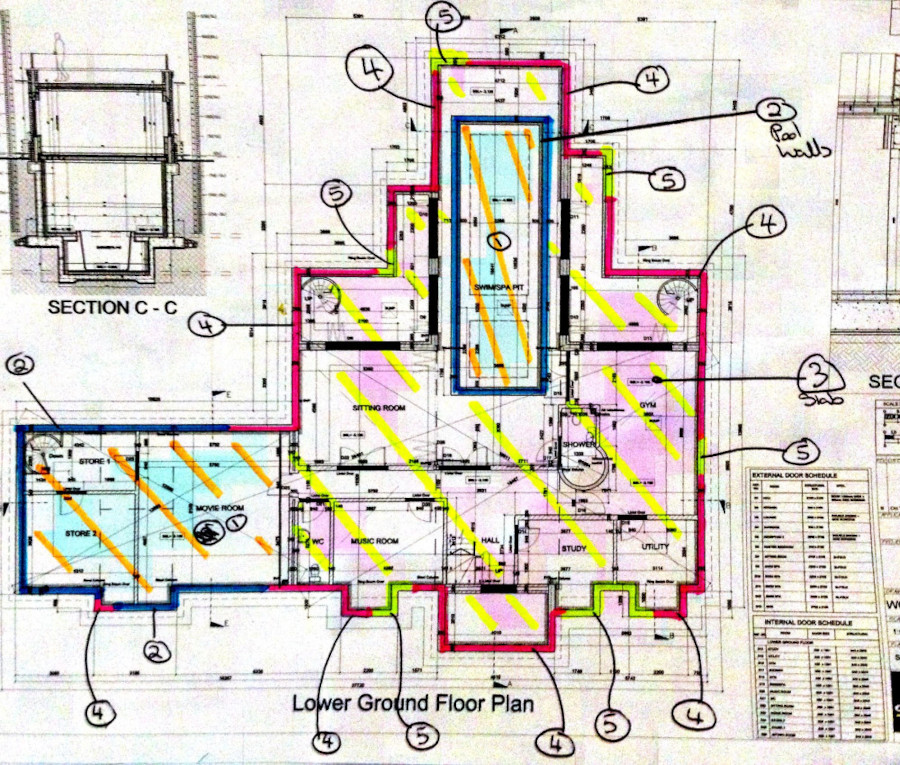
I think this usual practice is probably more expensive.
It could be cheaper for the contractor, because he can run away with the money months before the leaks are discovered; which will only be after the roof is on, windows are in, the basement pumped of rain water that collected and the basement cleaned and dried.
The client foots these extra costs of fixing leaks.
Here are some links to companies that will repair your leaks for you.
Sika
Newton
David Ball Group. The people who sell Pudlo as well.
Delta
None of my self-build clients have any repairs.
The Basement Expert website is all about avoiding leaks by paying for everything and everyone yourself so that you have the power to stop what looks bad before it is too late.
|
|
Don't use a basement contractor if you want your work done well.
Back to the Basement Building Questions Answered menu.
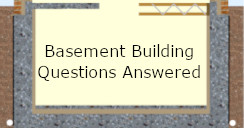
|
Forward to the Basement Building Construction Manual menu.
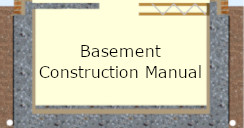
|
For a fixed fee of £199 I will answer all your questions by email. More details here.

|
Previous Page

|
|
Next Page
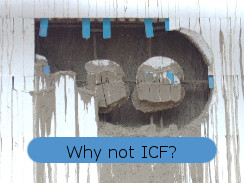
|
|
The Page After That

|
|
|
|

